Who is the blogger?
SNAM Video Trailer Collection Alphabetical Listing
Video Trailers from picks on TVOntario's Saturday Night at the Movies
Entries in Robert Benton (3)
Nobody's Fool (1994)
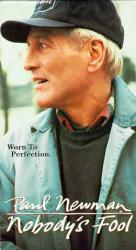 Paul Newman is “Nobody’s Fool” (1994) IMDb . Robert Benton’s delicately drawn portrait of aging also stars Jessica Tandy, Melanie Griffith and Bruce Willis. Newman plays Sully, a rascally character living in small town America who decides that it’s never too late after all to join the human race. Sully’s worked hard all his life to avoid facing up to inevitable realities. We’d all like to believe that people can get better and not just “older”, in spite of all the examples we see to the contrary. Newman is such a wonderful actor and Benton is such a masterful storyteller in this
Paul Newman is “Nobody’s Fool” (1994) IMDb . Robert Benton’s delicately drawn portrait of aging also stars Jessica Tandy, Melanie Griffith and Bruce Willis. Newman plays Sully, a rascally character living in small town America who decides that it’s never too late after all to join the human race. Sully’s worked hard all his life to avoid facing up to inevitable realities. We’d all like to believe that people can get better and not just “older”, in spite of all the examples we see to the contrary. Newman is such a wonderful actor and Benton is such a masterful storyteller in this 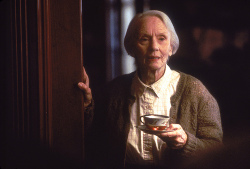 film that we’ll just have to become believers.
film that we’ll just have to become believers.
See the “Never Too Late” video interview preview for Nobody’s Fool from SNAM here.
Don't miss the entire TVO SNAM interviews for the "Never Too Late" episode. Includes a discussion of "Nobody's Fool" and "The Late Show" in the discussion of Hollywood films and the subject of aging.
Read Thom Ernst’s blog entry on the ageless Paul Newman .
<<Back to Midnight Oil main journal >>On to "Who's Directing Your Life?"
Catch the video trailer for Nobody’s Fool here.
Places in the Heart (1984)
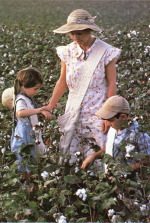 In “Places in the Heart” (1984), writer/director Robert Benton delivers a poignant portrait of a way of life as it once was in the deep South during the Depression era. Edna Spalding (played by Sally Field) finds herself in an unexpected place, facing life as a widow with two young children after her husband is suddenly killed. Edna seems to represent many women of her
In “Places in the Heart” (1984), writer/director Robert Benton delivers a poignant portrait of a way of life as it once was in the deep South during the Depression era. Edna Spalding (played by Sally Field) finds herself in an unexpected place, facing life as a widow with two young children after her husband is suddenly killed. Edna seems to represent many women of her  generation. She is ill-prepared to deal with the harsh realities of being a single parent in what is still very much a man’s world. She doesn’t even know how to write out a cheque, much less run a farm and earn a living. Sally Field’s character demonstrates courage, warmth and toughness in the face of overwhelming odds as she attempts to
generation. She is ill-prepared to deal with the harsh realities of being a single parent in what is still very much a man’s world. She doesn’t even know how to write out a cheque, much less run a farm and earn a living. Sally Field’s character demonstrates courage, warmth and toughness in the face of overwhelming odds as she attempts to 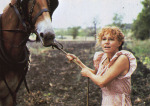 keep her family together during a deep economic and personal crisis.
keep her family together during a deep economic and personal crisis.
Danny Glover’s portrayal of the character Moze, a migrant worker who ends up helping Edna to work the farm and bring in the cotton, captures the essence 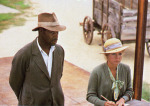 of the situation of the black man in this period of time. Moze searches not only for work to keep body and soul together, but for dignity to make life worth living. He finds both for just a moment with Mizz Spalding on a little farm just outside of the small town of Waxahachie, Texas.
of the situation of the black man in this period of time. Moze searches not only for work to keep body and soul together, but for dignity to make life worth living. He finds both for just a moment with Mizz Spalding on a little farm just outside of the small town of Waxahachie, Texas.
 John Malkovich plays Mr. Will, a complicated character whose injuries from the First Great War involve more than just the loss of his eyesight. As a boarder in the household, Mr. Will temporarily finds a place to belong and a group of people who need him almost as much as he needs to be needed.
John Malkovich plays Mr. Will, a complicated character whose injuries from the First Great War involve more than just the loss of his eyesight. As a boarder in the household, Mr. Will temporarily finds a place to belong and a group of people who need him almost as much as he needs to be needed.
Benton frames his semi-autobiographical work with bookends in the form of two hymns that open and close the film. (See below) These scenes set up a 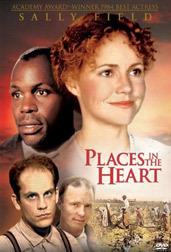 context for understanding the rest of the action of the film. As with the folksy irregular rhythm of the cotton pickin’ ballads in the middle of the movie, the music comes out of the real life experiences of the townspeople. The music is presented as something that’s a part of what the people here really live. It’s not just an ornamental backdrop for the dramatic action.
context for understanding the rest of the action of the film. As with the folksy irregular rhythm of the cotton pickin’ ballads in the middle of the movie, the music comes out of the real life experiences of the townspeople. The music is presented as something that’s a part of what the people here really live. It’s not just an ornamental backdrop for the dramatic action.
The final scene with the communion in church raises particular issues. Everything else in the film has been firmly anchored in reality until the final frames of the film. Why is it that unreality suddenly takes over? Edna’s dead husband and his killer, the young black man, who was brutally killed by a lynch mob, suddenly appear sitting in church. Sitting there in the pew, they seem as normal as every other member of the community as the communion plate is passed. My thought is that it has to do with what  Robert Benton wants to show us about his main characters and the community they live in. “Places in the Heart” may be a memory of a place and a time that no longer exist. The magic in it is that Benton manages to help us to understand something of what it was like to live there and then, just as he lived it.
Robert Benton wants to show us about his main characters and the community they live in. “Places in the Heart” may be a memory of a place and a time that no longer exist. The magic in it is that Benton manages to help us to understand something of what it was like to live there and then, just as he lived it.
See the TVO Saturday Night at the Movies in depth Interviews as the subject of "Surviving the Depression" is treated in two films shown on SNAM: "Places in the Heart" (1984) and "Pennies from Heaven"(1981).
>>Real Life: Everything in life seemed to be going fine. That all changed the day Tamara learned she had incurable cancer and was faced with only a few uncertain years to live. Where do you turn when confronted with a no-win situation?
>>More to see: Looking for more out of life?
See the framing opening and closing scenes with accompanying music from "Places in the Heart".
The Late Show (1977)
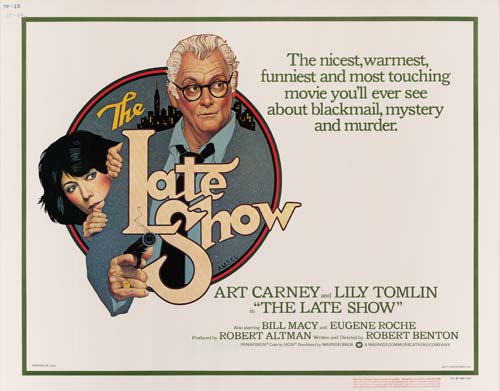 “The Late Show” (1977) with Art Carney and Lily Tomlin pairs a cranky has-been detective with a kooky young woman who hasn’t quite got her life under control. The odd couple is formed when minor crimes and misdemeanours escalate to a major blackmail and murder case. Things become unexpectedly serious both on the investigation front and the personal relationship side of things. Two slightly out of step and lonely individuals find that they have something to contribute to one another’s lives. Robert Benton directs this backward glance at the hardboiled detective film noir movies of the 1940’s à la Raymond Chandler/Philip Marlowe. The film leaves behind a surprisingly touching picture of the subject of aging thanks to good acting on the part of the lead characters and the support of Benton’s direction as well as a decent script.
“The Late Show” (1977) with Art Carney and Lily Tomlin pairs a cranky has-been detective with a kooky young woman who hasn’t quite got her life under control. The odd couple is formed when minor crimes and misdemeanours escalate to a major blackmail and murder case. Things become unexpectedly serious both on the investigation front and the personal relationship side of things. Two slightly out of step and lonely individuals find that they have something to contribute to one another’s lives. Robert Benton directs this backward glance at the hardboiled detective film noir movies of the 1940’s à la Raymond Chandler/Philip Marlowe. The film leaves behind a surprisingly touching picture of the subject of aging thanks to good acting on the part of the lead characters and the support of Benton’s direction as well as a decent script.
 See the TVO video preview for the "Never Too Late" presentation with "Nobody's Fool" and "The Late Show"
See the TVO video preview for the "Never Too Late" presentation with "Nobody's Fool" and "The Late Show"
The companion piece in this series, "Nobody's Fool" with Paul Newman, Jessica Tandy, Bruce Willis and Melanie Griffith was also reviewed on Midnight Oil.
<<Back to Midnight Oil main journal
>>On to "Who's Directing Your Life?"
Don't miss the entire TVOntario Interview for the "Never Too Late" episode. Included is a discussion of "Nobody's Fool" and "The Late Show" in the conversation about Hollywood films and the subject of aging.




